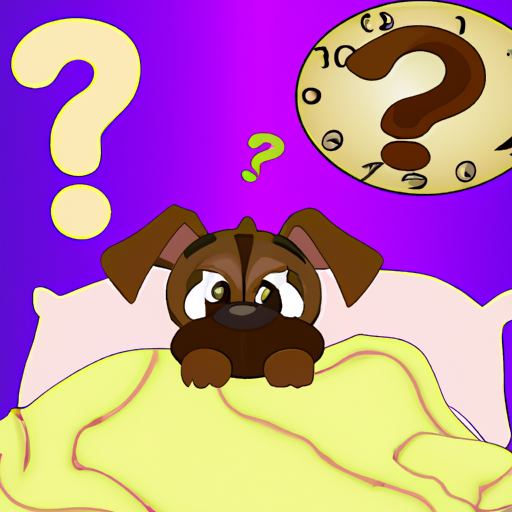As a caregiver, understanding your puppy’s sleep requirements is vital. The amount of sleep a puppy needs can vary based on age, breed, and activity level. This guide will help you understand your puppy’s sleep needs, how to establish a healthy sleep routine, and answer common questions.
Understanding Puppy Sleep Requirements
Puppies are like babies, they require a lot of sleep to support their rapid physical growth and learning.
- Newborn puppies (0-3 weeks): They sleep almost 22-20 hours per day.
- Young puppies (3-12 weeks): They sleep around 18-20 hours per day.
- Older puppies (12 weeks to 6 months): They sleep approximately 16-18 hours per day.
Remember, every puppy is different and these are just general guidelines.
Factors Affecting Puppy Sleep
Several factors can affect how long a puppy sleeps:
- Age: Younger puppies sleep more than older ones.
- Activity Level: More active puppies may need more sleep.
- Breed: Larger breeds tend to sleep more than smaller ones.
Importance of Sleep for Puppies
Sleep is crucial for a puppy’s development. Just like humans, puppies go through a REM sleep phase, which is when most of the growth and development happen. Lack of sufficient sleep can affect their mood, health, and overall development.
Establishing a Sleep Routine
Creating a consistent sleep routine for your puppy can help them feel secure and make training easier. Here are some steps to follow:
- Create a Comfortable Sleeping Environment: Make sure your puppy has a quiet, comfortable place to sleep.
- Follow a Regular Feeding Schedule: Regular feeding times will help regulate your puppy’s sleep.
- Establish a Bedtime Routine: This could include a quiet playtime, a final potty break, and then bedtime.
Tips for Dealing with Sleep Disturbances
Puppies, like babies, may have sleep disturbances. Here are some tips to help:
- Patience: Remember that this is a normal part of your puppy’s development.
- Quiet Time: Avoid stimulating your puppy before bed.
- Comfort: Make sure your puppy is comfortable and safe.
Understanding Sleep Problems
If your puppy seems to be sleeping too much or too little, it may be a sign of a health problem. Always consult your vet if you’re concerned about your puppy’s sleep patterns.
Common Sleep Problems in Puppies
Some common sleep problems in puppies include:
- Insomnia: Yes, dogs can get insomnia too. It’s often due to anxiety or health issues.
- Sleep Apnea: This is common in breeds with flat faces, like bulldogs and pugs.
- Narcolepsy and Cataplexy: These are neurological disorders that affect a dog’s ability to regulate sleep-wake cycles.
FAQ
Q: Can a puppy sleep too much?
A: Yes, if your puppy is sleeping more than the upper range of the normal amount for their age, it might be a sign of a health issue. Consult your vet if you’re concerned.
Q: Why is my puppy so hyper before bed?
A: Puppies often have a burst of energy before they’re about to go down for a long sleep. This is normal.
Q: Should I wake my puppy up to pee at night?
A: For very young puppies, you might need to, but as they grow older, they should be able to hold it through the night.
Q: Can I sleep with my puppy in my bed?
A: It’s advised to train your puppy to sleep in their own bed, but it’s a personal choice. If you do want your puppy in your bed, wait until they’re fully potty-trained.
Q: My puppy seems to have nightmares, is that normal?
A: Dogs do dream, and sometimes they can have bad dreams. If your puppy seems to be having a nightmare, it’s okay to gently comfort them.
Remember, every puppy is unique. Understanding and respecting your puppy’s individual sleep needs will help them grow into a healthy, happy dog.



